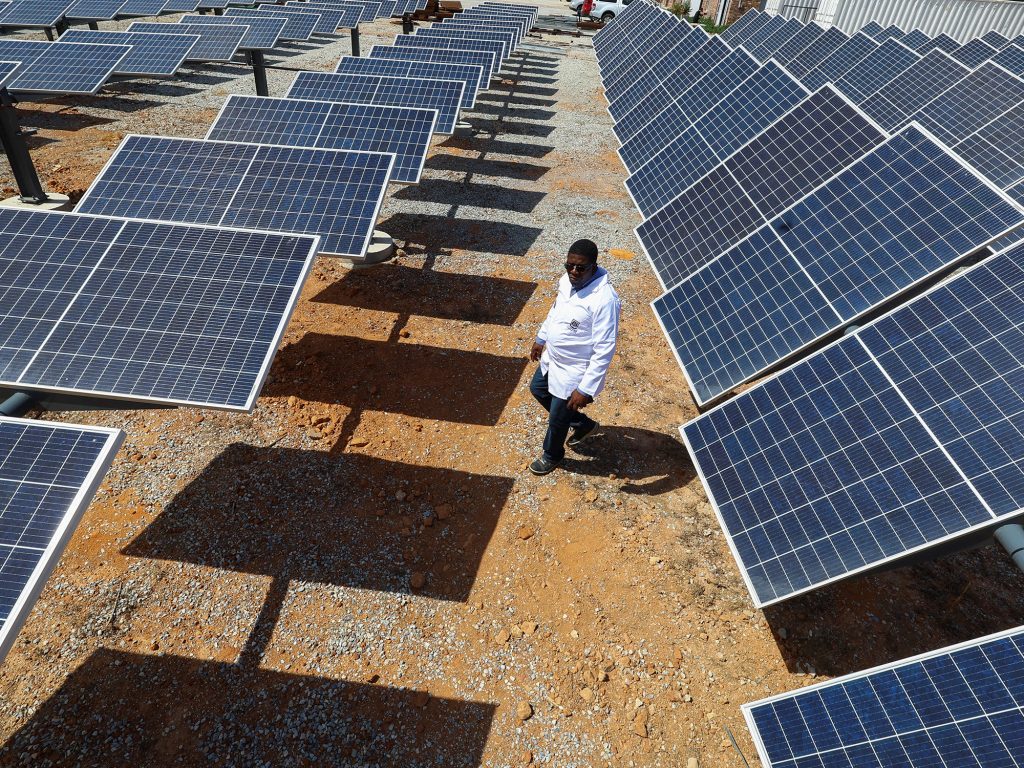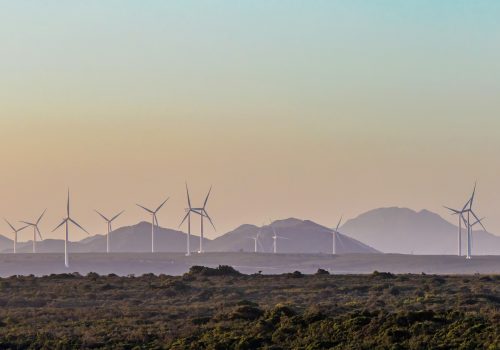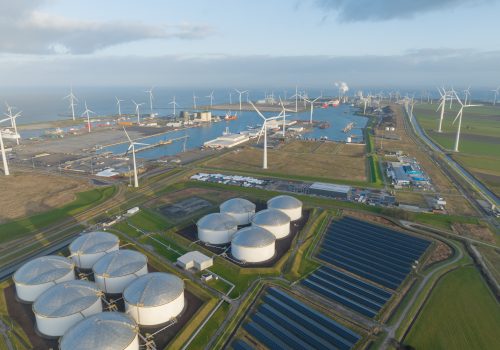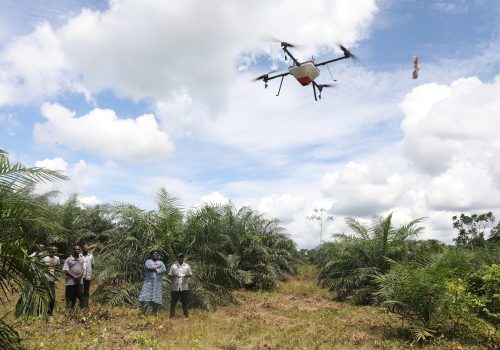On the first day of the United Nations Climate Change Conference (also known as COP28) in Dubai, global leaders reached a deal on where to house and how to fund loss and damage costs for the countries most vulnerable to climate change. It’s an important development for African stakeholders, who are concerned about the escalating impact of climate change on the continent. As African heads of state and government wrote in their Nairobi Declaration—adopted at the Africa Climate Summit in September—the continent is warming faster than the rest of the world, despite it being responsible for a small fraction of global carbon emissions. These changes will gravely impact the continent’s economies and societies.
But will COP28 give Africa the attention it deserves on other climate needs? Our experts, some of whom are headed to Dubai, outline what is at stake for Africa.
1. What are African countries hoping to achieve at COP28?
First, there is a strong and well-accepted push among African countries for a change in narrative, recasting the continent from a recipient of climate aid to a full participant in climate solutions. Following the Summit for a New Global Financing Pact in June, the Africa Climate Summit in September, and the Annual International Monetary Fund-World Bank Meetings in October, Africans are hoping to secure a place for themselves to do more on adaptation and mitigation because—despite having the lowest greenhouse gas emissions in the world—they live in the continent that is the most affected by climate change.
Second, governments are grappling with debt sustainability, while balancing the need to address the climate crisis. Even though climate is a priority for leaders, they must balance their climate-related initiatives with poverty alleviation, health, education, and debt financing. Governments are starting to think creatively about how to bring more money into the system—climate finance is becoming an important part of the solution.
COP28 will offer the grounds to test, improve, and challenge innovative financing products such as debt-for-nature swaps (such as the $500 million debt-for-nature swap deal in Gabon), a variety of bonds focusing on social and environmental impact, carbon markets, blended finance, and more. A promising trend that will likely have impact on the ground in Dubai is the push for green banks, which can be seen in examples across the African continent, including in an initiative with the African Development Bank.
Finally, as a new push for innovative technology—in solar and wind energy, and in newer fields such as carbon capture and green hydrogen—is underway, African entrepreneurs are looking to carve a place for themselves as leaders in climate technology and will likely be looking for opportunities to scale their solutions at COP28.
—Jacqueline Musiitwa is a nonresident fellow with the Atlantic Council’s Africa Center
African countries are managing a delicate balancing act when it comes to the green transition.
On one hand, African countries are among those which suffer the worst from the negative impacts of climate change while having contributed the least to global warming. On the other hand, the African continent has the lowest energy access rates in the world, with more than six hundred million people lacking access to electricity.
There is considerable need for energy on the continent, and the private sector and public decision makers face dilemmas in deciding how to get that energy to people. Given the large economic development challenges, it may be tempting to prioritize short-term access to energy, whatever the source (especially oil and gas). African countries must reconcile economic development with the green transition—or, rather, ensure that the green transition is the faster route to economic development.
At COP28, African countries—with their widely differing energy access, natural resources, and green transitions—will seek the recognition of their unique circumstances and the need for tailored support. They will likely call for a differentiated approach to climate action, acknowledging that Africa’s priorities differ from those of developed countries and other regional groupings. They are likely to advocate for a fair transition and seek concrete and significant financial support for adaptation and mitigation measures—including financing to build better energy infrastructure.
In that respect, COP28 is an opportunity to show that the green transition boosts, rather than hinders, economic development by mobilizing and driving investment towards green energy infrastructure. Africa’s abundant renewable resources (including solar, wind, hydropower, and biomass) can help foster economic development by providing clean, affordable, and reliable energy while also meeting decarbonization and net-zero climate goals.
—Emilie Bel is a nonresident fellow with the Atlantic Council’s Africa Center
2. How will COP28 be different from previous years?
COP28 will likely unfold like its predecessors—African countries will call for the realization of promises made at past conferences, particularly pledges made by developed countries that have benefited from carbon-intensive growth. The cynical view would be that, by the end of the convening, COP28 probably will not be too different than UN climate conferences in the past. But given that COP28 will be in the United Arab Emirates (UAE), and Gulf countries have become major sources of global capital recently, there may be more announcements of new climate initiatives backed by Gulf governments focused on Africa. In September, the UAE committed $4.5 billion to finance climate projects in Africa, and in October, Saudi Arabia hosted the first Saudi-Africa summit. There seems to be a willingness by Gulf countries to partner and put forth financing offers—the question is how the projects will be structured.
—Aubrey Hruby is a nonresident senior fellow with the Atlantic Council’s Africa Center and leads the Africa Center’s work on climate and energy issues.
3. Which African issues related to finance, inclusion, and technology and innovation—COP28’s biggest themes—are likely to draw attention?
The question of climate justice is deeply tied to Africa’s development experience and will characterize discussions at COP28 as well. African countries have contributed the least to carbon emissions yet bear enormous costs. Without a sensitivity to the climate justice issues at play, it will be difficult to make meaningful progress.
In addition to discussions about the need to develop natural gas capacity, there will be discussions around how to ensure African countries and companies meaningfully participate in newly minted climate finance flows and green technologies. Expect discussions to prioritize three key technologies: green hydrogen, electrical vehicle batteries, and nuclear. Africa’s role in the critical minerals that are necessary for electric vehicles will certainly be highlighted in Dubai as the conference continues to unfold. Not many people are talking about Africa’s nuclear potential yet—though the world arguably should. Bangladesh has just inaugurated its first nuclear power plant, but it is yet to be seen how this fits into the African context.
With six hundred million people lacking reliable access to electricity on the continent, there is a dual imperative for African countries to go green and connect their populations to power resources. This must be recognized at COP28 to meaningfully make progress in Dubai.
4. Will the Nairobi Declaration, issued by African leaders following the Africa Climate Summit, affect negotiations at COP28?
Since COP27 in Sharm el-Sheikh, African stakeholders have been working to develop a unified African position that can meet the needs and challenges of the continent. The Africa Climate Summit helped African countries achieve consensus on key negotiation points such as global decarbonization and openness to green investment (summarized in the Nairobi Declaration) strengthening the continent’s negotiating position and supporting efforts to initiate a big push to help Africa green.
With the Nairobi Declaration having helped drive an African consensus, two subjects should dominate the African agenda as COP28 unfolds. The first topic is ensuring that Africa is not marginalized in the green industrial revolution, which can be achieved with a focus on technology appropriations and with Africa serving as a foundation of green value chains. Second, leaders should push to secure a climate-finance architecture capable of financing the continent’s greening needs. Attracting more private capital is paramount, but leaders should also place pressure on developed countries to meet the one-hundred-billion-dollar climate finance pledge, mobilize new resources, and implement key reforms—for example, initiatives to ensure Africa gets fair prices for its carbon credits.
—Jean-Paul Mvogo is a nonresident senior fellow with the Atlantic Council’s Africa Center and author of “Developing Green Banking Ecosystems: A Solution to Better Finance Green Challenges and Address Climate Change in Africa,” a new Africa Center report to be launched at COP28.
5. How are discussions around critical mineral extraction likely to play out?
This year has seen Africa’s importance in the green energy transition increase because of the number of critical minerals in Africa’s soil.
There is an increased push by African countries to localize supply and production chains of critical minerals (such as lithium, cobalt, and copper) and other resources. For example, a new agreement between Botswana and De Beers Group commits the jeweler to move more of the value chain to Botswana, and a memorandum of understanding between Zambia and the Democratic Republic of the Congo (with support of the United States and European Union) sets them up for collaboration on the processing of copper and cobalt for electric vehicles locally. The trend will likely continue.
Developed countries’ increased focus on Africa’s critical mineral deposits, coupled with rising competition to access those resources, creates an opportunity for Africa and its trade partners to avoid repeating history—one in which partners lost out when mining and exporting raw or scarcely processed natural resources. New cooperation models should favor virtuous cycles—characterized by local, value-added transformation and ownership. By creating much-needed jobs and local added value, those new value chains could help offset the social consequences of climate change, reduce migratory pressures, and generate the resources to achieve the United Nations Sustainable Development Goals. Those value chains could be drivers of “glocal” prosperity and stability, if well structured.
6. COP28 participants include not only government leaders but also private-sector leaders. What is their role in supporting African countries?
Private sector funding has to play a massive role.
To achieve the green transition, mobilizing billions in investment for green energy infrastructure will be necessary. Today, African governments are the first source of infrastructure financing (33 percent of total commitments). The current financing gap is too large to be bridged by public funding alone. African countries therefore need to explore multiple financing sources, especially private funding.
In every discussion at COP28, officials will have to look at how the private sector, and especially international investors, can be leveraged. The current trend is a mix between public and private financial tools.
7. Will the coalition of African countries likely see support from other regional groups?
Africa shares similar climate vulnerabilities and demands as many other developing countries in Latin America and small island developing states. Many of these countries face increased debt vulnerability, reduced fiscal space, pressing social issues, and high borrowing costs when seeking to implement climate change adaptation and mitigation programs.
African negotiators, as peers of other developing regions, are also focused on ensuring that climate policies in developed countries do not harm development objectives in developing countries. By adopting policies, such as carbon trade measures, developed countries may inadvertently weaken key systemic sectors in developing countries without providing the adequate support to help those sectors transition to greener standards.
Further reading
Thu, Nov 30, 2023
Accelerating clean energy deployment in emerging markets
Enabling net-zero solutions By
Renewable energy resources are technologically and economically advanced and well poised to accelerate the energy transition. However, to supercharge renewable energy deployment in all markets, improved framework, reforms and instruments are necessary.
Thu, Nov 30, 2023
The energy transition can proactively shape a more equal and inclusive world
Enabling net-zero solutions By
The urgency of the energy issues does not provide the luxury of time; ways to deliver affordable, reliable, and clean energy while accelerating the transition to cleaner renewable energy sources is imperative.
Tue, Sep 19, 2023
Unlocking Africa’s agricultural potential
Issue Brief By
The ongoing digital revolution in Africa presents a valuable opportunity to revolutionize the continent’s food systems.
Image: Stanford Chidziva, acting director of Green Hydrogen, looks at the solar panels at the site where Keren Energy constructed the first proof of concept of green hydrogen production facility in Africa at Namaqua Engineering in Vredendal, in collaboration with The Green Hydrogen Institute for Advanced Materials Chemistry (SAIAMC) at the University of the Western Cape, South Africa, November 15, 2022. Photo via REUTERS/Esa Alexander.



